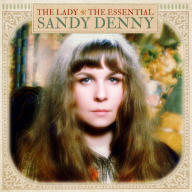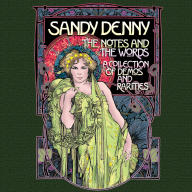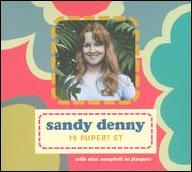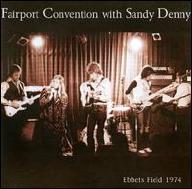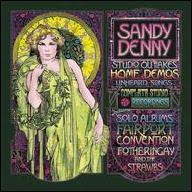Sandy Denny was born Alexandra Elene McLean Denny in 1947 in Wimbledon, London. She took classical piano lessons as a child and became interested in singing at a young age. However, it was while studying to be a nurse that she began to pursue music seriously in the mid-'60s, partially at the encouragement of the then-struggling Simon Garfunkel, whom she met when they were still unknown. She was also friendly with the American folksinger Jackson Frank, and recorded a couple of his songs on her first album (now available as The Original Sandy Denny). While this solo acoustic recording was her most traditional folk effort, it showed considerable potential, which she came closer to realizing on the 1967 album she recorded as a member of the Strawbs. This found her singing with fuller folk-rock arrangements, and also included her first recorded composition, "Who Knows Where the Time Goes." The song gave Denny her first international recognition when Judy Collins recorded it in 1968.
Denny was tapped to replace Judy Dyble in Fairport Convention in 1968, and is prominently featured on their late-'60s albums What We Did on Our Holidays, Unhalfbricking, and Liege and Lief. These are not only recognized as Fairport's best work but as some of the finest British folk-rock records of all time. Although Denny shared the lead vocal chores with other members of the group, it was her singing that highlighted the best tracks, such as "Tam Lin," "Fotheringay," and "Autopsy" (the last two of which she wrote).
Denny left Fairport Convention in 1970 and formed the short-lived Fotheringay, which also included her future husband, Trevor Lucas, on guitar. However, following the release of their eponymous 1970 debut, the group disbanded, leaving a second LP uncompleted. Denny signed with Island Records and made her solo debut with 1971's The North Star Grassman and the Ravens, which featured instrumental and production contributions by Richard Thompson. It reached number 31 on the U.K. Albums chart. Also that year, she duetted with Robert Plant on the song "The Battle of Evermore" off Led Zeppelin's Led Zeppelin IV.
More albums followed including 1972's Sandy and 1974's Like an Old Fashioned Waltz. However, label issues interfered with Denny's tour plans and she and Lucas rejoined Fairport Convention, appearing on a live album and the group's 1975 studio session Rising for the Moon. Leaving Fairport Convention for a second time the following year, she returned to solo work with 1977's Rendezvous. Produced by Lucas, the album featured more of a contemporary pop/rock sound than her previous music. It included a cover of Elton John's "Candle in the Wind." Denny, who suffered from depression and substance abuse, died on April 21, 1978, from injuries sustained in a fall down a flight of stairs.
In 1998, Island released Gold Dust, a recording of her final live performance taped at London's Royalty Theatre on November 27, 1977. A four-disc anthology, Live at the BBC, arrived in 2007 compiling all of her solo recordings for the corporation, including a DVD of her live performances on the 1971 program One in Ten. In 2010, the singer's estate and Island Records commissioned singer/songwriter Thea Gilmore to take some of Denny's unpublished lyrics and songs and rework them into a finished album. It was released in 2011 as Don't Stop Singing. ~ Matt Collar & Richie Unterberger, Rovi



